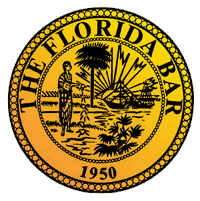There comes a time in most people’s lives when they will need or want to seek legal advice or services. One of the first questions a person may ask themselves is whether they need a lawyer for their particular case whether it be a dispute, real estate or business transaction, or estate planning.
Can a paralegal help me with my legal problem?
I recently saw an advertisement in the paper from someone who called himself a paralegal, which said he could help me with my legal problem for a lot less than a lawyer. Can this person really help?
No, a nonlawyer cannot help you with your legal problem. Legally, only a licensed member of The Florida Bar can help you with your legal problem and give you legal advice. A lawyer’s job is to make the law work for everyone. Consumers often use the services of lawyers to help them draw up wills, handle real estate transactions, and deal with other important legal needs. If a nonlawyer attempts to help you with your legal problem, that person may be prosecuted for the unlicensed practice of law (UPL), and your case may be affected.
Do paralegals have training or do they work with a lawyer?
But this person is a paralegal. Doesn’t that mean they have training or that they work with a lawyer?
No. In fact, so many people were being misled about the titles “paralegal” and “legal assistant” that the Supreme Court of Florida approved a rule saying that it is not proper for nonlawyers to use those titles if they are providing services directly to the public. Paralegals working in a law office often do have training and often are certified. They also have a code of ethics that they must follow, and they work under a lawyer’s supervision, not on their own. Nonlawyers who do not work for a lawyer might not have any training and should not be using the title “paralegal.”
What can this nonlawyer do for me?
The only thing the nonlawyer can legally do for you is to sell you a pre-printed form and type in the information that you provide. A nonlawyer cannot tell you what information you should put on the form, or even what type of form to use, and cannot help you fill it out. Basically, the nonlawyer can act as a secretary or typist.
How do I know if the form provided by a nonlawyer is right?
You do not. You cannot rely on the nonlawyer to do it right. You are really representing yourself. Again, nonlawyers can only supply forms and type in the information you provide.
The ad says that nonlawyers provide the same services as a lawyer. Is that true?
No, that is not true. A lawyer can give you legal advice and go to court with you. A nonlawyer cannot give legal advice and cannot go to court. There are other important differences between a lawyer and a nonlawyer:
- Lawyers are required to have a college degree and a law degree. There are no legal education requirements for nonlawyers.
- Lawyers are required to pass a stringent admittance examination to determine their competency, as well as a thorough character and fitness investigation, before being admitted to practice law. There are no such requirements for nonlawyers.
- Lawyers are required to maintain current legal education and take ethics courses periodically. There is no continuing education requirement for nonlawyers.
- Lawyers are subject to comprehensive and tough ethical rules. There are no written ethical standards for nonlawyers.
- Lawyers who are accused of misbehavior are investigated by The Florida Bar, and such an investigation can lead to the loss of a license to practice law. Nonlawyers are not professionally accountable to any authority, although they can be investigated and prosecuted for engaging in the unlicensed practice of law.
- Lawyers are required to maintain client confidences. Nonlawyers have no such requirement and could tell your secrets to anyone, even the other side.
- Lawyers as a profession maintain a Clients’ Security Fund, which is intended to reimburse clients for some of their losses if a lawyer misappropriates trust funds. There is no such program for nonlawyers. A nonlawyer who steals from you or does not provide the services that were promised cannot be forced to give you your money back.
